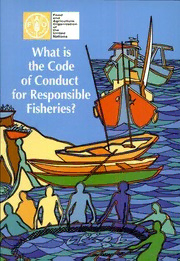
What is the code of conduct for responsible fisheries? PDF
Preview What is the code of conduct for responsible fisheries?
Food and Agriculture Organization of the United Nations CoverDesignby EmanuelaD’Antoni Copyrightedmaterial What is the Code of Conduct for Responsible Fisheries? FOODANDAGRICULTUREORGANIZATIONOFTHEUNITEDNATIONS Rome,2001 Copyrightedmaterial Reprinted2001,2002,2003,2005 Thedesignationsemployedandthepresentationofmaterial inthisinformationproductdonotimplytheexpressionofany opinionwhatsoeveronthepartoftheFoodandAgriculture OrganizationoftheUnitedNationsconcerningthelegalor developmentstatusofanycountry,territory,cityorareaorof itsauthorities,orconcerningthedelimitationofitsfrontiers orboundaries. ISBN92-5-104541-0 Allrightsreserved.Reproductionanddisseminationofmaterialinthis informationproductforeducationalorothernon-commercialpurposesare authorizedwithoutanypriorwrittenpermissionfromthecopyrightholders providedthesourceisfullyacknowledged.Reproductionofmaterialinthis informationproductforresaleorothercommercialpurposesisprohibited withoutwrittenpermissionofthecopyrightholders.Applicationsforsuch permissionshouldbeaddressedtotheChief,PublishingManagementService, InformationDivision,FAO,VialedelleTermediCaracalla,00100Rome,Italy [email protected] ©FAO2001 Copyrightedmaterial WHATISTHECODEOFCONDUCTFOR RESPONSIBLEFISHERIES? Fisheries (which includes the management, catching, processing, marketing of fish stocks) and aquaculture (the farming of fish) provide an important source of food, employment, incomeandrecreationforpeoplethroughoutthe world. Millionsofpeopledependuponfishfortheirlivelihoods. Ifthere isto beenoughfishforfuture generations, everyone involvedinfishingmusthelpconserveandmanagetheworld’s fisheries. Withthissituation inmind, morethan 170Membersof the Food and Agriculture Organization ofthe United Nations (FAO)adoptedtheCodeofConductforResponsibleFisheries in 1995. The Code is voluntary rather than mandatory, and aimedateveryoneworkingin,andinvolvedwith,fisheriesand aquaculture, irrespectiveofwhethertheyarelocated in inland areas or in the oceans. Becausethe Code is voluntary, it is necessary to ensure that all peopleworking in fisheries and aquaculturecommitthemselvestoitsprinciplesandgoalsand takepracticalmeasurestoimplementthem. TheCodeofConduct,whichconsistsofacollectionof principles, goalsandelementsforaction, tookmorethantwo years to elaborate. Representatives from members of FAO, inter-governmentalorganizations,thefishingindustryandnon- governmental organizations worked long and hard to reach agreementontheCode.Itisthereforearesultofeffortbymany differentgroups involved infisheries and aquaculture. In this respecttheCoderepresentsaglobalconsensusoragreement onawiderangeoffisheriesandaquacultureissues. Governments, in cooperation with their industries and fishing communities, have the responsibilityto implementthe Code. FAO'sroleistotechnicallysupporttheiractivitiesbutit Copyrightedmaterial 2 does not have a direct responsibility for implementation because FAO does not have a responsibility for the development and implementation of national fishery policies. Thisisthesoleresponsibilityofgovernments. Implementation of the Code will be most effectively achieved when governments are able to incorporate its principles and goals into national fishery policies and legislation. To ensure thatthere is supportforthese policies and legislative changes, governments should take steps to consultwithindustryandothergroupstopromotetheirsupport and voluntary compliance. In addition, governments should encouragefishingcommunitiesand industrytodevelopcodes ofgoodpracticethatareconsistentwith,andsupport,thegoals and purpose ofthe Code of Conduct. These codes of good practice are another important way of promoting the implementationoftheCode. The purpose of this booklet is to describe, in a non- technical manner, some important aspects of the Code of Conduct.Itishopedthatthisinformationwillmakepeoplemore awareofthe goals and purpose ofthe Code and encourage themtoimplementitinallfisheries,irrespectiveofwhetherthey are small-scale or large-scale in nature, and in aquaculture. ThisbookletdoesnotreplacetheCodeofConductbutsimply triestomakemoreinformationaboutitavailable. The Code has been translated by FAO into its five official languages: Arabic, Chinese, English, French and Spanish. In addition, governments, industry and other organizations have made unofficial translations of the Code into other languages, including Albanian, Croatian, Estonian, Farsi,German,Icelandic,Indonesian,Italian,Japanese,Polish, Russian, Sinhalese, Slovenian, Tamil, Thai, and Tigrina. The text of some of these languages can be found on the FAO FisheriesDepartmentWebsiteontheInternet. Forthosepeoplewhowouldliketoknowmoreaboutthe CodeofConductandtoobtainacopyofthetext,visittheFAO Copyrightedmali:ia 3 FisheriesDepartmentWebsiteontheInternet.Theaddressof theWebsiteisasfollows; http://www.fao.orq/fi/aareem/codecond/codecon.asp. IfyoudonothaveaccesstotheInternet,pleasecontact: The Chief of Service, FIPL/Fisheries Department, Food and AgricultureOrganization,VialedelleTermediCaracalla,00100 Rome,Italy,foracopy.Pleasebesuretospecifywhetheryou wanttheCodeinArabic,Chinese,English,FrenchorSpanish. Background Toguaranteethebestpossiblesuppliesoffishforfuture generations,theCodeofConductstressesthatcountriesand all those involved in fisheries and aquaculture should work together to conserve and manage fish resources and their habitats. All people involved in fisheries should strive to maintain orrestorefish stocksto levels capable ofproducing reasonableamountsofcatchbothnowandintothefuture.The termmaximumsustainableyieldisoftenusedtodescribethis level ofcatch. This meansthata country’sfishing operations andpoliciesshouldbedesignedwithaviewtoachievinglong- termsustainableuseoffishresources,asameansofassuring resourceconservation,continuedfoodsuppliesandalleviating povertyinfishingcommunities. Therefore,therealpurposeoftheCodeofConductisto help countries and groups of countries, develop or improve theirfisheriesandaquaculture,inordertoreachthisgoal. Itiswell knownthatthedevelopmentofgood fisheries policies requires finance, skills and experience that may not Copyrightedmaterial 4 always be available in developing countries, and particularly not in least developed countries and small island countries. TheCodeencouragesinternationalorganizationssuchasFAO to assist these countries develop their national capacities in ordertoimprovetheirabilitytodevelopand managefisheries andaquaculture. The Codedescribes howfisheries should be managed responsibly,and howfishingoperationsthemselvesshould be conducted. Itthenaddressesthedevelopmentofaquaculture, the linking offisherieswith othercoastal zone activities, and the processing and selling of the catch. The importance of countries cooperating with one another in all aspects of fisheriesishighlightedintheCode. TheCodedoesnotexplainexactlyhowfishers,industry andgovernmentsshouldtakethenecessarypracticalstepsto implement the Code. For this reason FAO is developing detailedguidelinesonarangeofdifferenttopicstosupportthe Code'simplementation.Thepurposeoftheseguidelines isto give practical and technical advice to fishers, industry and fisherymanagersastothestepsthatmightbetakentoensure thattheCodeisimplementedasitwasintended. FisheriesManagement The Code advocates that countries should have clear and well-organized fishing policies in order to manage their fisheries. These policies should be developed with the cooperation of all groups that have an interest in fisheries. Copyrightedmaterial 5 including the fishing industry, fish workers, environmental groupsandotherinterestedorganizations. Where cooperation among countries in fishery conservation and management is necessary because fishery resourcesaresharedamongcountries,theCodecallsfornew regionalfisheryorganizationstobeestablishedorforexisting organizations to be strengthened. Cooperation in this way is theonlyrealisticapproachtoachievingthelong-termgoalsthat were discussed in the preceding section ofthis booklet. The role ofregional fishery organizations is considered further in thesectionrelatingtoRegionalandInternationalCooperation. Itisimportantthatfishingindustriesatalllevelsoperate within a clearfisheries management and legal framework so thateveryoneinvolvedinfisherieshasaclearunderstandingof therulestobefollowed. Fisheriesshouldbemanagedtoensurethatfishingand fishprocessingareconducted inwaysthatminimizenegative impactsonthe environment, reduce waste, and preserve the quality of fish caught. Fishers should keep records of their fishingoperations.Governmentsshouldhaveenforceablelaws with procedures for determining and punishing violators. Punishment for violations could include fines or even the removaloffishinglicencesifviolationsaresevere. When developing fisheries policies, it is important to consider a number of issues. These'include, among other things,thecostsandbenefitsoffishingandtheenvironmental andsocialimpactsoffishing. In preparing these policies, countries should use the best scientific information available while taking into account traditional fishing practices and knowledge where it is appropriate to do so. In the absence of adequate scientific information, countries should act more cautiously in setting fishinglimits. Xhis One 6 All people and organizations concerned with fishing should be encouraged to share their views and opinions on fishingissues.Particularattentionshouldbegiventotheneeds oflocalpeoplewhodependuponfisheriesfortheirlivelihoods. Countries should strive to educate and train fishers and fish farmers, so that they can be involved in developing and implementingpoliciestoensuresustainablefisheriesnowand inthefuture. To protect fish resources, dynamiting, poisoning and otherdestructivefishing practices should be prohibited in all countries. Countries should ensure that only fishing vessels permittedfishintheirwaters. Suchfishingshouldbedoneina responsible manner and in accordance with any rules, regulationsorlawsthatmaybeappliedbyacountry. To avoid overfishing (taking so much fish thatthefish stockswill decline in thefuture), the size ofthe fishing fleet should not be too large for the natural supply of fish. In addition,theeffectsoffishinggearontheenvironment(impacts oncoralreefs,forexample)shouldbeunderstoodbeforeusing a new fishing gear. Fishing methods and gear should be selective, and designed to minimizewaste and promote high survivalratesforescapingfish. Gearshouldalsominimizethe catchingoffishspeciesthatarenotwanted(non-targetorby- catch fish) orthat are endangered. Fishing gear and fishing methodsthatare not selective orwhich cause high levels of wasteshouldbephasedout. Vessel supplies should be purchased with a view to minimizingwasteandgarbage.Theownersandcrewoffishing vesselsshouldensurethatdischargesofwastedo notcause majorpollution. Toprotectairquality,countriesshouldadoptguidelines thataimatreducingthereleaseofdangerousexhaustgasand the release of ozone-depleting substances found in the Copyrightedmaterial
